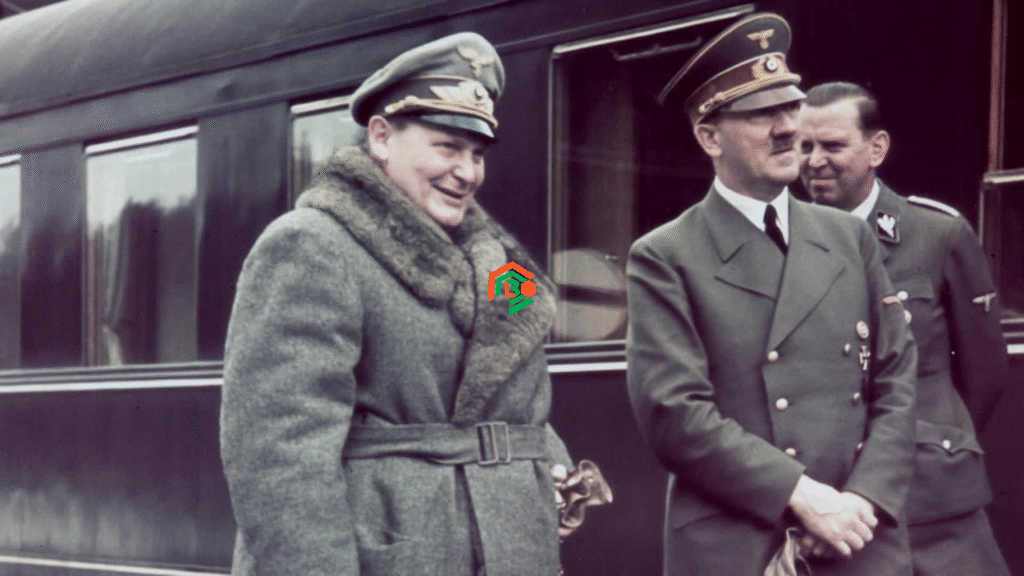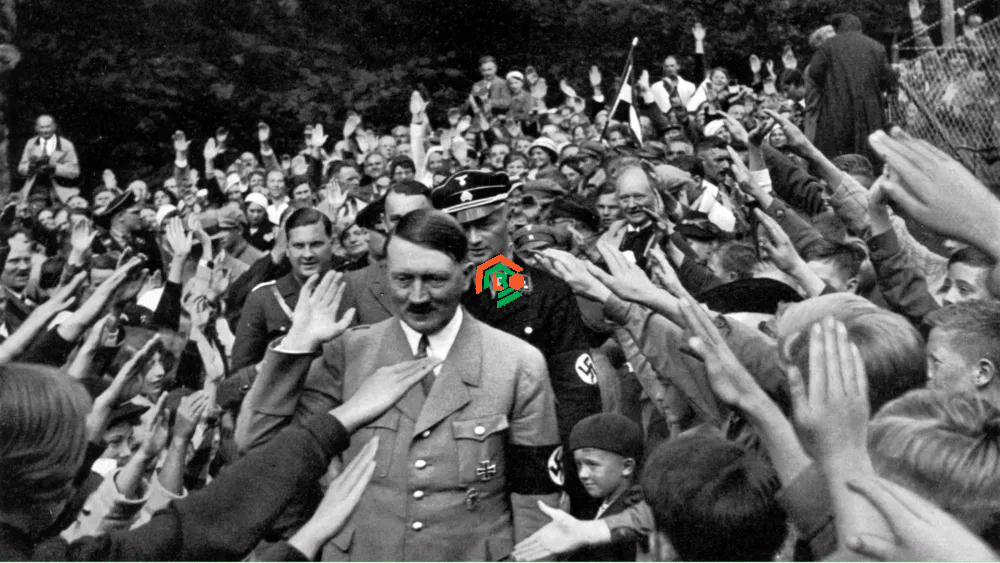Most people know Adolf Hitler as the dictator who led Nazi Germany during World War II. But have you ever wondered how rich he really was? Hitler wasn’t just a political leader; he was also a wealthy man. This article explains everything in simple terms — from where his money came from to what happened to it after his death.
What Was Hitler’s Net Worth?
Adolf Hitler’s net worth during his lifetime is estimated to have been around $5 million to $6.5 million USD at the height of his power in the late 1930s and early 1940s. That’s a lot of money—even by today’s standards—and especially considering he didn’t come from a wealthy family. In today’s dollars, when adjusted for inflation, Hitler’s net worth could be closer to $150 million or even more. But unlike most people, Hitler didn’t earn his fortune in the usual way. He used a mix of book royalties, government funds, personal gifts, and other shady sources to build his wealth. What’s shocking is that he never paid income taxes, and much of his fortune came from the people he ruled over.
How Did Hitler Make His Money?
Hitler didn’t have a job like most people. He didn’t run a business or invent anything. Instead, his money came from three main sources: his book sales, gifts from supporters, and state funds. Hitler used his political position to gain personal wealth. In simple words, once he rose to power, he used his influence to make himself rich.
He began making money from the sale of his book Mein Kampf, which became extremely popular in Nazi Germany. But that wasn’t all. Wealthy Nazis and German citizens often gave him gifts, including money, luxury cars, and expensive art. On top of that, the government paid for almost all his personal expenses. He had a mansion, cars, and even a private retreat in the mountains—all funded by the state or private donations.
Money from “Mein Kampf” Book Sales
Hitler wrote Mein Kampf while he was in prison in the 1920s. The book shared his political ideas and plans for Germany. At first, it didn’t sell very well. But after Hitler became Chancellor in 1933, things changed. The government pushed people to buy the book, and it became a bestseller in Germany. Many people were even forced to buy it. It was given as a wedding gift, a graduation present, or even a mandatory household item.

By the late 1930s, Hitler had earned millions of Reichsmarks from Mein Kampf. It’s estimated that he made around $1 million per year in royalties. Over time, this made him a multimillionaire. And here’s the surprising part: the book was often bought with taxpayer money, which means regular Germans unknowingly helped make Hitler rich.
Gifts from Supporters and the Nazi Party
Once Hitler became the leader of Germany, many rich supporters gave him expensive gifts. These included luxury cars, artworks, rare antiques, and large amounts of cash. High-ranking Nazi officials and loyal businesspeople would donate money and treasures to win his favor.
Some people even donated land and built homes for him, like the Berghof, his mountain retreat in the Alps. These gifts were not simple presents—they were political moves to stay close to power. Hitler accepted all of it and never turned down a valuable gift.
Government Funds and No Taxes
Hitler’s wealth didn’t just come from book sales and gifts. The government also paid for nearly everything he did. He lived in luxury but didn’t spend much of his own money. The German state covered his homes, staff, travel, and even his personal security.
Even more shocking, Hitler never paid taxes. Records show that he owed back taxes in the 1920s, but once he rose to power, those records disappeared. As a dictator, he simply declared himself tax-exempt. This saved him hundreds of thousands of Reichsmarks, and let him grow his wealth even faster.
What Expensive Things Did Hitler Own?
Despite his image as a “simple man,” Hitler owned luxury cars, including custom-made Mercedes-Benz models, fine art collections, designer furniture, and multiple residences. One of his most famous homes was the Berghof in the Bavarian Alps—a mansion that overlooked the mountains and was decorated with rare art and expensive furnishings.
He also had access to the Reich Chancellery, a grand government building in Berlin that doubled as his palace. These properties were maintained at the highest level of luxury, filled with gold-trimmed furniture and imported decorations. Though many of these items were state property, Hitler treated them as his own.
Did Hitler Steal Any Wealth?
Yes, Hitler was involved in the looting of enormous amounts of wealth, especially from Jewish families and occupied countries. As the Nazis took control of Europe, they stole gold, art, jewelry, bank accounts, and businesses. Much of this wealth was used to support the Nazi regime, but a portion ended up in Hitler’s personal possession or under his direct control.
The Nazis confiscated entire estates and sold them or handed them over to Nazi leaders. In many cases, these stolen assets were hidden or redistributed through secret financial channels. Hitler benefited from this system, which helped increase his power and wealth without leaving a clear money trail.
Where Was Hitler’s Money Stored?
Hitler didn’t use regular bank accounts like most people. Much of his money was stored through the German government’s treasury, and some of it was hidden in Swiss bank accounts, which were famous for secrecy at the time. There are also reports that Hitler’s personal fortune was managed by close aides who kept detailed records hidden from the public.
He kept valuable art and rare items in secret locations, including underground bunkers and private safes. The Nazi Party also had its own financial system, which meant Hitler could move money around without outside oversight. All this made it hard to track exactly how much money he had and where it was stored.
Hidden Gold and Secret Vaults

What Happened After Hitler Died?
After Hitler died by suicide in 1945, many people wondered what happened to his wealth. Most of his personal assets were taken by the Allied forces. Some of the gold, art, and cash he owned were recovered in secret Nazi vaults. But a lot of it was never found.
Some believe that Nazi gold was hidden in tunnels, lakes, or buried deep underground, and to this day, treasure hunters are still looking for it. His personal bank accounts were frozen, and his properties were seized. But many valuables simply vanished in the chaos at the end of the war.
Was Hitler One of the Richest Leaders in History?
Compared to other world leaders, Hitler was definitely one of the richest dictators of his time. While he didn’t reach the level of wealth seen in some modern billionaires, he had full control over a country’s resources, which made him extremely powerful and wealthy. His fortune, built through a mix of legal and illegal means, was significant.
When adjusted for inflation, Hitler’s wealth would put him on the same level as other rich dictators like Joseph Stalin, Muammar Gaddafi, or Saddam Hussein—leaders who also used state funds to enrich themselves.
Thoughts – Why Hitler’s Wealth Still Matters
Why should we care about how rich Hitler was? Because it shows how power can lead to corruption. Hitler didn’t start rich, but he used his position to gain wealth and live in luxury while millions of people suffered. His wealth came from a mix of legal book sales, illegal theft, and political favoritism.
Understanding his net worth also helps us see how dictators can misuse public resources. It’s not just about money—it’s about how power can be abused for personal gain. Learning this history can help prevent similar situations in the future.
How Did Hitler Get Rich?
In simple terms, Hitler got rich through a combination of book sales, stolen wealth, political power, and the support of rich followers. He didn’t earn his money the honest way. Instead, he took advantage of his leadership role to avoid taxes, accept expensive gifts, and take control of government funds. He also benefited from the looting of Europe during World War II. All of this made him one of the wealthiest and most powerful figures in modern history.
The Bottom Line
Hitler’s net worth may seem shocking today, but it’s a powerful example of how wealth can be built through control, corruption, and fear. He started with very little and ended up owning millions—without ever running a business or inventing anything. His money came from book royalties, gifts, state funding, and stolen assets.
Understanding Hitler’s net worth helps us see another side of his story—not just the war and politics, but the personal fortune he built behind the scenes. It also teaches us a bigger lesson: when leaders have unchecked power, they can use it to enrich themselves at the cost of others. Knowing this makes us more careful about who we trust with power in the future.


